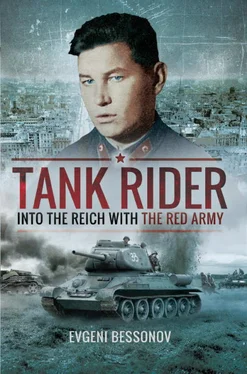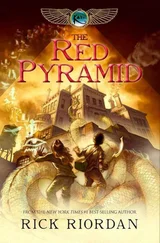The company joined the battalion, and before I could report completion of the mission and Lieutenant Kolosov’s wound, the battalion commander shocked me, saying: ‘And where have you been? I have not seen you in the attacking line, and you are dry, huh?’ At first I did not understand him. Then I felt offended. I had to remind Kozienko about the order that he gave to Kolosov and me three hours earlier. Tank crews had reported completion of the mission through radio. The battalion commander did not answer anything to that, but told the surrounding officers: ‘Bessonov is cunning, crossed the river and did not get his feet wet.’
Soon we reached the eastern outskirts of the city. I am not mistaken – it was the eastern outskirts, as our 4th Tank Army and other mobile units of the front marched from north to south, thus practically cutting off retreat routes for a large group of German troops east of Kamenets-Podolsk. The Brigade and some other units took to the defensive in order to contain the retreating German troops to prevent their breakthrough on good roads with access to west and south to Dniester and direct their retreat on earth roads, full of dirt.
As it turned out later, the front failed to complete the encirclement. Because of significant losses in personnel and hardware, the mobile units of the first Ukrainian front just did not have sufficient strength to do it. It could be seen on the example of our 1st motor rifle battalion and other units of the 49th Motor Rifle Brigade – in that period we suffered irreplaceable losses in personnel. The weather failed us as well.
By the morning of 26 March, 1944, the town of Kamenets-Podolsk was fully liberated from the enemy. We were so happy that we spontaneously organized dinner with German snacks and wines. We sent the guards out, and all gathered in an abandoned house and celebrated victory all night long. I did not really like parties at the front line – I had my meal, had a bit of wine and left to check the outposts, where I found that one machine-gun crewman was dead. It was snowing heavily and I could clearly see footprints of the Germans who fled from the town. I gathered several resting soldiers and we ran along the footprints, but did not catch them and so we came back. Having reinforced the outposts, I gave the order to open fire on any shadow that appeared in the blizzard. The soldiers honestly followed my order and fired at any silhouette. By the morning it was all quiet, and the German exodus from the city was over.
By the morning everyone, except for the guards, slept like a rock. Exhaustion had accumulated during the unceasing day and night battles, when we barely slept for several hours or did not have any sleep at all, falling asleep literally while we walked
In the morning we organized the defence of the outside of the town, in the field in front of a ravine. To the left of us there were some village buildings – the mortar company of the battalion settled there. Further out there was the 3rd company, that had ten to fifteen soldiers left under platoon leader Alexei Belyakov. The 2nd company also had no more than fifteen men, led by platoon leader Nikolai Chernyshov. Our company, which was temporarily under my command, had at least 30 soldiers, almost the same number as the two other companies combined.
Despite this, battalion commander Captain Kozienko, battalion’s chief of staff Captain Belan and deputy battalion commander for political affairs Captain Gerstein decided to merge our 1st company with the 2nd company. The battalion commander called on me and declared this decision to me, as well as the appointment of Chernyshov, platoon leader from the 2nd company, to the post of company commander. I thought that I would stay the commander of my company, as it had more soldiers left than in the 2nd and the 3rd companies combined. Besides this, I had in fact been the company’s commander in the course of all the previous days, receiving orders directly from the battalion commander. Having expressed my dissatisfaction, I asked them to keep me as the commander of our company, and not to merge it with the 2nd company, but merge the 2nd and the 3rd companies instead, appointing Chernyshov as the commander of the combined company. However, my arguments were ignored and the order remained the same. I had to obey the order – one cannot argue in the army, whether the order is wise or not, you have to follow it, especially at the front. What can you do, the commanders should know better, that is why they are commanders! That was the unsuccessful end of my first, but not my last, attempt to get promoted.
Our combined company dug in at the outskirts of Kamenets-Podolsk on a bad spot, in the open in front of a ravine, really more of a hollow. The opposite side of the hollow was higher, and our position could be clearly seen from there. At the same time, a bit behind us was a good natural defence – a mound. I proposed that we dig in there, but no one listened to me. Soldiers dug foxholes and put their weapons, which had no ammo, on breastworks; next to them they put German weapons with ammo and two or three German grenades. Each soldier had a bottle or two of wine to help them keep warm. There were no serious frosts, but living in the open under rain and snow at zero temperatures night and day is a really unpleasant thing. We shivered with the cold. Behind the mound we could at least light fires, but even in the foxholes soldiers found a way to keep themselves warm, covering the foxholes with German rain capes and blankets. I also had two blankets, and covered my foxhole with them during the night – it kept the trench amazingly warm. I would dig a foxhole myself or with my orderly. All soldiers and most junior officers had the small entrenching tool with them, including me. The soldiers had their entrenching tools in a case that they put on their belt, while I had a folding German tool that I carried in my hand. I carried it like this till the end of war.
We did not have gas masks – they only frustrated us in battle, especially the tank riders. I, like many of the soldiers, did not wear a helmet – they were heavy and slid down on to your face. Defending the city of Kamenets-Podolsk, we had to pick up German small arms: submachine-guns, rifles and machine-guns, as we had no ammo for our own weapons. Right up to the end of the operation some soldiers carried two types of weapons, their own and German weapons, before we received ammo for our weapons. The Germans tried to drop ammo and sometimes food to their encircled troops. Two containers with ammo fell in our hands, and company Sergeant Major Bratchenko took the parachute silk for industrial purposes. Silk could be traded for moonshine and lard in villages.Villagers made blouses and underwear from the parachute silk.
I would sleep little during the night, checking the guards, especially in the second half of the night – what if they fell asleep or missed the Germans, or did not pay attention to them? Anything could happen. Regular inspection of the positions became my obligatory habit, and my soldiers knew about my night checks and felt safer that their commanding officer was not asleep.
We stayed in defence for several days. Germans appeared on one of the days, but they did not attack the company, capturing several houses some 100 metres to the left of our defences. They opened fire, mostly from rifles, even on individual soldiers. Interesting indeed, that the Germans could approach secretly, and apparently were already there in the evening or in the night, but we only spotted them in the morning. This was exactly what I always feared – that we would fail to spot the enemy. However, most likely it was a small scout party that was searching the area trying to find retreat routes to the west and good roads that wheeled vehicles could use. We returned fire from all possible weapons, as we had plenty of ammo and we did not have to save it. Because of this need to save ammo we had not fired on the enemy freely for a long time. The Germans ceased fire, and so did we. At the same time we could hear heavy firing on the positions of the 3rd company (then it was the 2nd) and the battalion’s mortar company.
Читать дальше












